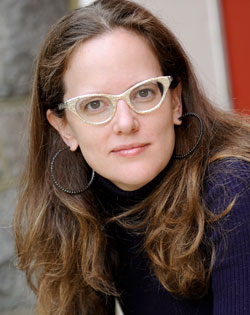 Lauren Winner's books include Girl Meets God and Still: Notes on a Mid-faith Crisis, which is just out from HarperOne (January 31, 2012). Winner has degrees from Duke, Columbia and Cambridge universities, and holds a Ph.D. in history. The former book editor for Beliefnet, Lauren teaches at Duke Divinity School and lives in Durham, N.C. Her favorite things include quilts, October weather and her tricycle.
Lauren Winner's books include Girl Meets God and Still: Notes on a Mid-faith Crisis, which is just out from HarperOne (January 31, 2012). Winner has degrees from Duke, Columbia and Cambridge universities, and holds a Ph.D. in history. The former book editor for Beliefnet, Lauren teaches at Duke Divinity School and lives in Durham, N.C. Her favorite things include quilts, October weather and her tricycle.
On your nightstand now:
The summer 2001 issue of Lapham's Quarterly--on food; The Sauvignon Secret: A Wine Country Mystery by Ellen Crosby--one of about nine mystery series I read obsessively; Thomas Merton's letters to writers.
Favorite book when you were a child:
Anything in the Sweet Valley High series.
Your top five authors:
Nancy Lemann, Marilyn Hacker, Barbara Hamby, Vida Dutton Scudder, Lauren Slater.
Book you've faked reading:
The Seven Storey Mountain by Thomas Merton.
Book you're an evangelist for:
Mr. Bridge and Mrs. Bridge by Evan Connell. The economy of Connell's prose kills me.
Book you've bought for the cover:
I recently bought three books I already owned--the copies I had were falling apart paperbacks that I didn't really like reading very much, and when, at the Quail Ridge bookstore in Raleigh, N.C., I saw the new (?) Penguin classics hardbacks, I thought, "I'll enjoy reading Jane Eyre much more if I have that copy." Their editions of Fitzgerald are especially alluring.
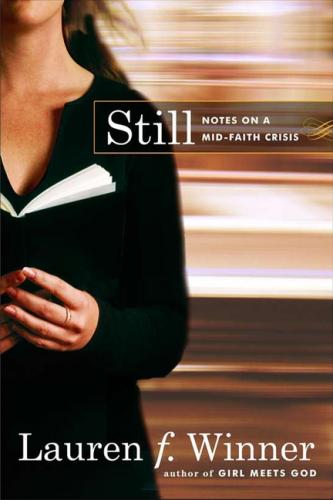 Book that changed your life:
Book that changed your life:
At risk of being a total dork, my answer is an article, not a book: Siobhan Garrigan's "Intellectuals in the Public Square." It's very rare that I read a scholarly essay that totally revolutionizes everything--but this article utterly transformed what I know to be happening when I go to church.
Here's a second answer, this one a book: Journeys of Simplicity: Traveling Light with Thomas Merton, Basho, Edward Abbey, Annie Dillard & Others by Philip Harnden. This book is, essentially, a collection of lists. My friend Lil recommended it to me in maybe 2004, and I found it uninteresting. Then a few years later, I picked it up again and (to borrow the old Quaker phrase) it really spoke to my condition. In my own life--my personal life, my spiritual life--I had come to a place of total crisis and despair, where, willy-nilly, I was traveling light because most of the things I had been accustomed to having as traveling companions had dissolved or died or shriveled up. The book itself became my traveling companion.
Favorite line from a book:
"[T]he great world of suburbanism come[s] to its fullest and most vivid realization in Clapham.... This is the intention and lesson of Clapham--that man was born a little lower than the angels, and has been descending into suburbanism ever since." --The Suburbans by Thomas William Hodgson Crosland.
Book you most want to read again for the first time:
E. Lockhart's Ruby Oliver quartet. Lockhart has to be one of the sharpest YA authors out there. I read the Ruby novels last summer--it was one of those panting experiences, in which I finished one book and, whatever city I was in, I headed to the local bookstore to search for the next installment. I didn't want to leave Ruby's company or Lockhart's prose, and I felt bereft when the quartet ended.
Book that keeps surprising you with new layers of meaning each time you read it:
Straight Man by Richard Russo. This is academic satire at its best. The first time I read it, I simply reveled in the humor--I laughed out loud the whole way through. On each of three subsequent re-readings, though, I keep realizing that it's much more than a smart send-up. It's incredibly wise about human nature, about frailty.
Most horrifying moment while reading a book:
About two years ago, I was rereading Dorothy Sayers's Have His Carcase, and I realized that I was now older than Harriet Vane. It was a sad day.
Favorite book about books:
U and I by Nicholson Baker.
 A recent national survey by the Institute for Local Self-Reliance confirmed widespread reports that locally-owned independent businesses experienced strong sales growth and community support during the holiday season. Bookselling This Week reported that that the ILSR survey, conducted in partnership with several business organizations, including the American Booksellers Association, "gathered data from 1,768 independent businesses across 49 states over an eight-day period in January." Key findings include:
A recent national survey by the Institute for Local Self-Reliance confirmed widespread reports that locally-owned independent businesses experienced strong sales growth and community support during the holiday season. Bookselling This Week reported that that the ILSR survey, conducted in partnership with several business organizations, including the American Booksellers Association, "gathered data from 1,768 independent businesses across 49 states over an eight-day period in January." Key findings include:







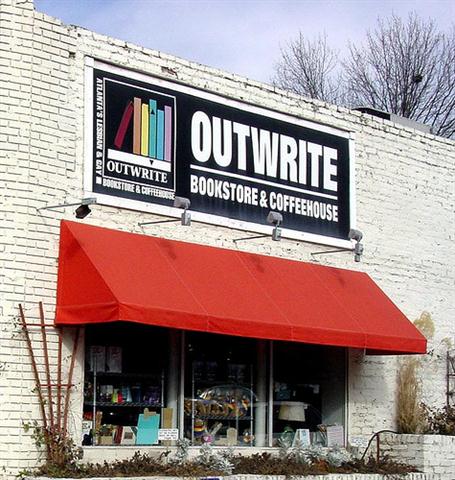
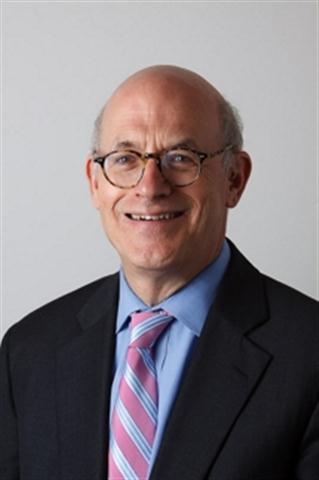 Dubbing him "Amazon's Hit Man," Bloomberg Businessweek featured
Dubbing him "Amazon's Hit Man," Bloomberg Businessweek featured 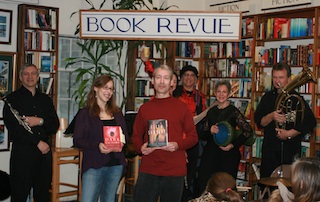
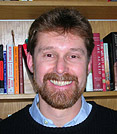 Dan Chartrand, owner of Water Street Bookstore, Exeter, N.H., may be joining the ranks of bookseller-elected officials, according to the Exeter Patch:
Dan Chartrand, owner of Water Street Bookstore, Exeter, N.H., may be joining the ranks of bookseller-elected officials, according to the Exeter Patch: 
 Book that changed your life:
Book that changed your life: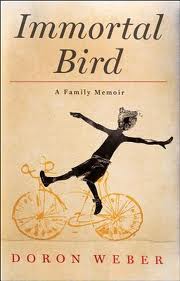 Doron Weber's memoir Immortal Bird begins with a simple moment of parental unease: during a stroll up a Brooklyn avenue, Weber senses that his 12-year-old son, Damon, is overdue for a growth spurt. Weber cannot help being extra-vigilant about his firstborn, a "blue baby" whose heart lacked a second ventricle, requiring two open-heart surgeries by the age of four. The second operation, a variation on the Fontan procedure, re-routed Damon's under-oxygenated blood past the missing pump area directly to his lungs where it could pick up oxygen and discharge carbon dioxide. With more oxygen-rich blood, Damon flourished for eight years, but unfortunately his father's worry proves significant: he has also developed protein-losing enteropathy (PLE), a rare and insidious post-surgical condition in pediatric Fontan patients which causes vital protein molecules to leak out of the digestive system. With no fail-safe treatment, the PLE diagnosis forces Doron and Shealagh Weber into a morass of medical decision-making while their son strives to lead the life of a typical teenager.
Doron Weber's memoir Immortal Bird begins with a simple moment of parental unease: during a stroll up a Brooklyn avenue, Weber senses that his 12-year-old son, Damon, is overdue for a growth spurt. Weber cannot help being extra-vigilant about his firstborn, a "blue baby" whose heart lacked a second ventricle, requiring two open-heart surgeries by the age of four. The second operation, a variation on the Fontan procedure, re-routed Damon's under-oxygenated blood past the missing pump area directly to his lungs where it could pick up oxygen and discharge carbon dioxide. With more oxygen-rich blood, Damon flourished for eight years, but unfortunately his father's worry proves significant: he has also developed protein-losing enteropathy (PLE), a rare and insidious post-surgical condition in pediatric Fontan patients which causes vital protein molecules to leak out of the digestive system. With no fail-safe treatment, the PLE diagnosis forces Doron and Shealagh Weber into a morass of medical decision-making while their son strives to lead the life of a typical teenager.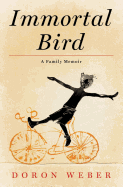
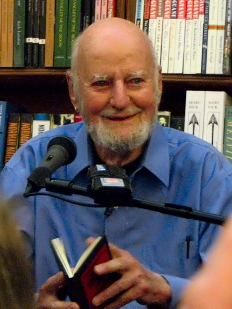 Last week, poet and City Lights bookstore co-founder
Last week, poet and City Lights bookstore co-founder 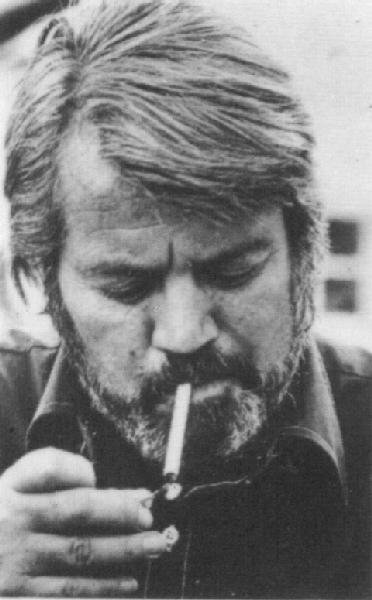 As a football literary equivalent to baseball's The Natural by Bernard Malamud, the News suggested Frederick Exley's A Fan's Notes, in which he wrote:
As a football literary equivalent to baseball's The Natural by Bernard Malamud, the News suggested Frederick Exley's A Fan's Notes, in which he wrote:  Since the Giants and Patriots are now headed to Indianapolis for Super Bowl Sunday on February 5, perhaps this year's literary gridiron spokesperson should be the late Kurt Vonnegut, an Indianapolis native. A
Since the Giants and Patriots are now headed to Indianapolis for Super Bowl Sunday on February 5, perhaps this year's literary gridiron spokesperson should be the late Kurt Vonnegut, an Indianapolis native. A